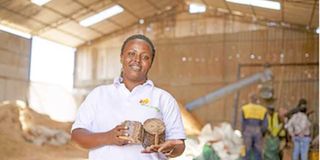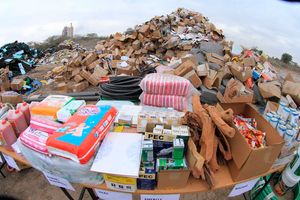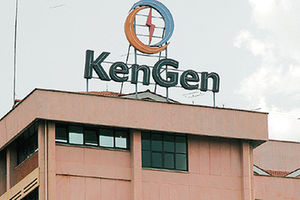
Mary Nyambura, pictured in December 2024 in Kajiado, is the founder of Eco-Charge Limited, an African-led renewable energy company converting agricultural waste into eco-friendly biomass briquettes. The company transforms agricultural waste into a climate solution by producing biomass briquettes from sawdust and bagasse. Additional raw materials include macadamia shells, rice husks, coffee husks, and flower stalks.
Every year, Kenya loses thousands of hectares of forest to illegal logging and unsustainable firewood. As climate change accelerates, the need for cleaner and more sustainable energy alternatives is becoming increasingly urgent.
It is within this context that Eco-Charge Limited, founded by Mary Nyambura, steps in.
This African-led renewable energy company is converting agricultural waste into eco-friendly biomass briquettes.
These briquettes are helping institutions such as schools, hospitals, hotels, and manufacturers transition away from polluting fuel sources, cutting carbon emissions and offering a model for a climate-resilient future that is both locally driven and economically viable.
“I began by making charcoal balls from cow dung and charcoal dust, and that ignited my passion for sustainable energy,” she says, adding that she recognised an opportunity to turn that passion into a business, one that could address both climate change and energy poverty.
She notes that the growing demand for cleaner energy, combined with rising fuel costs and widespread deforestation, made it clear that Kenya needed affordable, locally produced renewable energy solutions.
“We operate as a social enterprise focused on delivering impact through clean energy, women empowerment, and environmental stewardship.
The model prioritises gender inclusion, local sourcing, and sustainable practices, combining renewable energy production with job creation in rural areas, especially for underserved communities,” she explains.

Mary Nyambura, pictured in December 2024 in Kajiado, is the founder of Eco-Charge Limited, an African-led renewable energy company converting agricultural waste into eco-friendly biomass briquettes. The company transforms agricultural waste into a climate solution by producing biomass briquettes from sawdust and bagasse. Additional raw materials include macadamia shells, rice husks, coffee husks, and flower stalks.
The company transforms agricultural waste into biomass briquettes from sawdust and bagasse—the fibrous residue left after extracting juice from sugarcane.
Additional raw materials include macadamia shells, rice husks, coffee husks, and flower stalks. All materials are sourced from sawmills and factories in Kajiado County and neighbouring regions.
To maintain optimal briquette performance, the team closely monitors the quality and moisture content of the raw materials. Instead of allowing agricultural waste to decompose and release methane, a potent greenhouse gas, it is processed into dense, clean-burning fuel blocks.
“These briquettes burn longer and cleaner than traditional wood or charcoal. They produce less smoke, significantly reducing indoor air pollution, and emit lower levels of carbon dioxide,” she explains. Because the raw materials are waste products, their use also helps reduce the environmental burden of agricultural industries.
The production process begins with collecting and sun-drying raw materials to reduce moisture. Once dried, the mix is fed into a briquetting machine, which compresses it into cylindrical shapes with a 90mm diameter.
The finished briquettes are then packaged in 50kg bags, ready for distribution. They are competitively priced at Sh14 to Sh16 per kilogram.
On average, the company produces between 100 and 200 tons of biomass briquettes each month. Its clients, mainly factories, collectively consume over 1,000 tons per month.

Mary Nyambura, pictured in December 2024 in Kajiado, is the founder of Eco-Charge Limited, an African-led renewable energy company converting agricultural waste into eco-friendly biomass briquettes. The company transforms agricultural waste into a climate solution by producing biomass briquettes from sawdust and bagasse. Additional raw materials include macadamia shells, rice husks, coffee husks, and flower stalks.
The business also tailors its briquettes for high-demand clients. Offering bulk supply contracts enables these organisations to make long-term savings compared to regularly purchasing wood fuel.
“Institutions that switch to our briquettes typically save between 15 and 30 per cent on fuel costs. For example, a school in Kajiado reduced its monthly cooking fuel expenses by Sh20,000. Beyond financial savings, clients benefit from cleaner kitchen environments, improved staff morale, and a reduced environmental footprint,” she says.
To date, the company has partnered with over 10 institutions. “Since briquettes burn more efficiently, they emit fewer particulates and greenhouse gases,” she notes.
Despite its impressive progress, Eco- Charge faces significant challenges, including poor road infrastructure, low awareness, and cultural preferences for traditional fuels.
“We engage communities through sensitisation workshops and employment opportunities. We believe in inclusive growth, so we involve them not just as suppliers but also as partners in creating impact,” she adds.
Currently, the company employs 10 people and it aligns with SDGs 7 (Clean Energy), 13 (Climate Action), and 5 (Gender Equality). By reducing deforestation and promoting clean energy.
Eco-Charge directly supports Kenya’s Nationally Determined Contributions (NDCs) under the Paris Agreement, which aim to reduce carbon emissions by 32 per cent by 2030.
Despite ongoing challenges, the opportunities far outweigh the obstacles. Kenya’s growing focus on green energy and environmental conservation offers fertile ground for expansion. Supportive government policies, combined with rising corporate interest in sustainability, are creating a market increasingly receptive to clean energy solutions like those offered by Eco-Charge.
There is also strong potential for regional partnerships.
“We are currently building networks in East Africa and exploring licensing and distribution models in Tanzania and Zambia. Our goal is to scale sustainably while maintaining quality and a strong community focus,” says Nyambura.
The business foresees becoming East Africa’s leading clean cooking fuel provider, reaching over 10,000 institutions and offsetting millions of tons of CO₂ emissions.
Plans are also underway to establish satellite production units across the region to improve supply chain efficiency and local job creation.
To enhance production, the company is exploring improved briquetting machines, moisture meters, efficient dryers, and a solar-powered facility. Investments in infrastructure, such as an in-house weighbridge, will further support quality control and operational scaling.
“Africa is both a victim and a solution provider in the climate crisis. We are showing that home grown innovations can have global relevance. Our work challenges the narrative, positioning Africa not just as a recipient of aid, but as a hub of transformative ideas and leadership,” she concludes.









